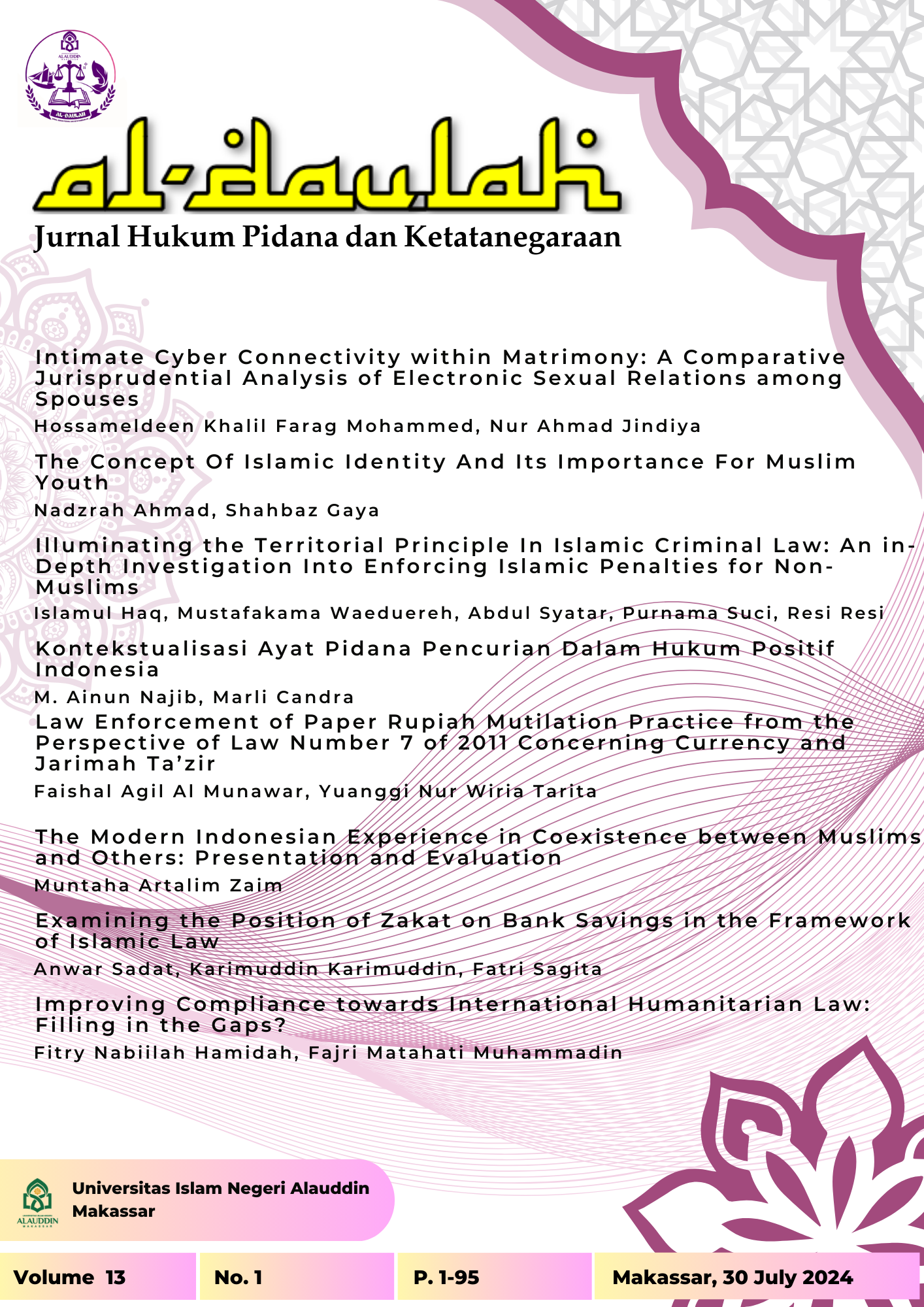The Controversy Of The Over Granting Remissions Against Narcotics Abused During The Covid-19 Pandemic
Abstract
The Covid-19 pandemic has a serious impact on many countries in the world, one is Indonesia. The misuse and distribution of narcotics in Indonesia has become a serious and worrying problem. Narcotics are a real threat and the eradication still requires serious handling, especially during the current Covid-19 pandemic. The implementation of massive remissions during a pandemic era like today has a lot of controversy. The legal issues that will be discussed in this paper are the controversy over granting remissions during the Covid-19 pandemic and how is the implementation of remissions to narcotics criminals during the pandemic? The research method used normative juridical research method which related to the provisions of normative law that apply in society. The results of this study show that the provision of large-scale remissions during the COVID-19 pandemic as today is controversy. This is because remission has an impact on perpetrators of abusing narcotics again. However, if remissions are not given to the prisoners, the inhabited prison will be overcapacity. This overcapacity will have an impact on ineffective services and empowerment in its implementation. This is part of a form of community-based punishment or social reintegration, namely the return of prisoners to the community, because for prisoners who get remission, it does not mean that they get a reduced sentence, but they serve the rest of their sentence outside prison.
Keywords: Narchotics; Pandemic Covid-19; Prisoner; Remission
References
Abdussalam, H. R., Sistem Peradilan Pidana (Jakarta: Restu Agung, 2007)
Afrizal, Said, ‘Pemberian Remisi Kepada Narapidana Sesuai Dengan Peraturan Pemerintah Nomor 99 Tahun 2012 Di Rutan Batam’, Journal Of Law And Policy Transformation, 2.2 (2017), 125–49
Agustiwi, Asri, and Reky Nurviana, ‘Kajian Kritis Terhadap Pembebasan Narapidana Dimasa Pandemi Covid-19’, Vol. 5 No. 1, Oktober 2020, 2020, 46–59 <https://ejournal.unsa.ac.id/index.php/rechtstaat-niew/article/view/509>
Appludnopsanji, Appludnopsanji, and Hari Sutra Disemadi, ‘Problematika Kebijakan Pembebasan Narapidana Sebagai Upaya Penanggulangan Covid-19 Di Indonesia’, Jurnal Wawasan Yuridika, 4.2 (2020) <https://doi.org/10.25072/jwy.v4i2.369>
Bawono, Joshua Gilbert, ‘Upaya Lembaga Pemasyarakatan Dalam Penanggulangan Penyalahgunaan Narkotika Oleh Narapidana Ditinjau Dari Undang-Undang Nomor 12 Tahun 1995 Tentang Pemasyarakatan’, Lex Et Societatis, 8.4 (2020) <https://doi.org/10.35796/les.v8i4.30921>
BNN, ‘Press Realease Akhir Tahun 2020 "Sikap Tegas BNN, Wujudkan Indonesia Bebas D Ari Narkoba.’, Badan Narkotika Nasional Republik Indonesia. (Jakarta, 2020) <https://bnn.go.id/press-release-akhir-tahun-2020.>
D, Mirnawati, ‘Hak-Hak Narapidana Wanita Di Lembaga Pemasyarakatan Kelas II A Watampone Perspektif Undang-Undang Nomor 12 Tahun 1995 Tentang Pemasyarakatan’, Jurnal Al-Dustur : Journal of Politic and Islamic Law, 2.1 (2019) <https://doi.org/10.30863/jad.v2i1.357>
Delinda, Anasarach Dea, ‘Peran Lembaga Pemasyarakatan Dalam Rehabilitasi Terhadap Narapidana Narkotika (Studi Di Lembaga Pemasyarakatan Narkotika Klas IIA Jakarta)’, Jurnal Poenale, 2017
Fovet, T., C. Lancelevée, M. Eck, T. Scouflaire, E. Bécache, D. Dandelot, and others, ‘Mental Health Care in French Correctional Facilities during the Covid-19 Pandemic’, Encephale, 46.3 (2020) <https://doi.org/10.1016/j.encep.2020.05.002>
Hidayat, Risyal Hardiyanto, ‘Implementasi Pemberian Remisi Narapidana Narkotika Dan Mekanisme Pelaksanaanya Menurut Perarturan Pemerintah No 99 / 2012’, Widya Yuridika, 3.2 (2020) <https://doi.org/10.31328/wy.v3i2.1645>
Jupri, Jupri, ‘Pemberian Hak Remisi Bagi Narapidana Narkotika Berstatus Justice Collaborator’, Al-Adalah: Jurnal Hukum Dan Politik Islam, 5.1 (2020) <https://doi.org/10.35673/ajmpi.v5i1.611>
Kompas, ‘Pembebasan 30.000 Narapidana Akibat Wabah Virus Corona’, Kompas.Com (Jakarta., 1 April 2020), p. 1 <https://nasional.kompas.com/read/2020/04/01/09314561/pembebasan-30000-narapidana-akibat-wabah-virus-corona?page=all>
Lu, Lvliang, Wenyu Zhong, Ziwei Bian, Zhiming Li, Ke Zhang, Boxuan Liang, and others, ‘A Comparison of Mortality-Related Risk Factors of COVID-19, SARS, and MERS: A Systematic Review and Meta-Analysis’, Journal of Infection, 2020 <https://doi.org/10.1016/j.jinf.2020.07.002>
Marzuki, Peter Mahmud, ‘Penelitian Hukum’. Jakarta: Kencana Group, 2005.
Nicola, Maria, Zaid Alsafi, Catrin Sohrabi, Ahmed Kerwan, Ahmed Al-Jabir, Christos Iosifidis, and others, ‘The Socio-Economic Implications of the Coronavirus Pandemic (Covid-19): A Review’, International Journal of Surgery, 2020 <https://doi.org/10.1016/j.ijsu.2020.04.018>
Novitasari, Novi, and Nur Rochaeti, ‘Proses Penegakan Hukum Terhadap Tindak Pidana Penyalahgunaan Narkotika Yang Dilakukan Oleh Anak’, Jurnal Pembangunan Hukum Indonesia, 3.1 (2021), 96–108 <https://doi.org/10.14710/JPHI.V3I1.96-108>
Raghavan, Vijay, ‘Prisons and the Pandemic: The Panopticon Plays Out’, Journal of Social and Economic Development, 2020 <https://doi.org/10.1007/s40847-020-00127-9>
Rohmah, Ivvany Ningtyas Seily, ‘Pemberian Remisi Kepada Pelaku Tindak Pidana Narkotika Perspektif Hukum Pidana Islam’, Al-Jinayah: Jurnal Hukum Pidana Islam, 3.1 (2018) <https://doi.org/10.15642/aj.2017.3.1.164-191>
Setiawan, Dimas Dharma, ‘Menilik Kebijakan Asimilasi Narapidana Di Masa Pandemi Covid-19’, Ditjenpas.Go.Id, 2020.
Sopacua, Margie G., Elsa R. M. Toule, Leony Lokollo, Yonna B. Salamor, and Astuti Nur Fadillah M, ‘The Effectiveness of Parole for Prisoners during the Covid-19 Pandemic’, Journal of Advances in Education and Philosophy, 4.11 (2020) <https://doi.org/10.36348/jaep.2020.v04i11.008>
Sujasmin, ‘Pemberian Remisi Bagi Narapidana Dan Anak Pidana Narkoba Di Lembaga Pemasyarakatan Menurut UU No. 12 Tahun 1995, Dan Peraturan Pelaksanaannya’, Jurnal Wawasan Yuridika, 2.2 (2018).
Sulianto, Harun, ‘Hak Narapidana Tindak Pidana Narkotika Untuk Memperoleh Pembebasan Bersyarat’, Jurnal Rechtens, 7.1 (2019).
Utami, Penny Naluria, ‘Keadilan Bagi Narapidana Di Lembaga Pemasyarakatan’, Jurnal Penelitian Hukum De Jure, 17.3 (2017), 381 <https://doi.org/10.30641/dejure.2017.v17.381-394>
Wajdi, Muh Barid Nizarudin, Iwan Kuswandi, Umar Al Faruq, Zulhijra Zulhijra, Khairudin Khairudin, and Khoiriyah Khoiriyah, ‘Education Policy Overcome Coronavirus, A Study of Indonesians’, EDUTEC : Journal of Education And Technology, 3.2 (2020) <https://doi.org/10.29062/edu.v3i2.42>
WHO, ‘World Health Organization. Coronavirus Disease 2019 (Covid-19) Situation Report 70’, 2020.
Wulandari, Sri, ‘Peran Lembaga Pemasyarakatan Dalam Pemberian Remisi Bagi Narapidana’, Spektrum Hukum, 14.1 (2019) <https://doi.org/10.35973/sh.v14i1.1103>
Zakaria, Chepi Ali Firman, ‘Kebijakan Formulasi Pemberian Remisi Yang Berorientasi Pada Kepentingan Narapidana Kasus Korupsi Dalam Sistem Peradilan Pidana Di Indonesia Dalam Rangka Pemenuhan Hak-Hak Narapidana’, Aktualita (Jurnal Hukum), 1.1 (2018) <https://doi.org/10.29313/aktualita.v1i1.3711>
The authors of a work hold the copyright and grant the Al-Daulah: Jurnal Hukum Pidana dan Ketatanegaraan the right of first publication. The work is also licensed under the Creative Commons Attribution License (CC BY 4.0), which enables others to share the work while acknowledging the authorship and initial publication in the journal. The authors can make separate contractual agreements for the non-exclusive distribution of the published version of the work, such as by posting it to an institutional repository or editing it for a book, with an acknowledgment of its initial publication in this journal. Authors are allowed and encouraged to post their work online, such as in institutional repositories or on their website, before and during the submission process. This can lead to productive exchanges and greater citation of the published work.


